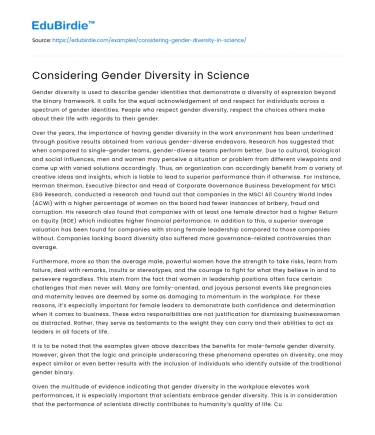Gender diversity is used to describe gender identities that demonstrate a diversity of expression beyond the binary framework. It calls for the equal acknowledgement of and respect for individuals across a spectrum of gender identities. People who respect gender diversity, respect the choices others make about their life with regards to their gender.
Over the years, the importance of having gender diversity in the work environment has been underlined through positive results obtained from various gender-diverse endeavors. Research has suggested that when compared to single-gender teams, gender-diverse teams perform better. Due to cultural, biological and social influences, men and women may perceive a situation or problem from different viewpoints and come up with varied solutions accordingly. Thus, an organization can accordingly benefit from a variety of creative ideas and insights, which is liable to lead to superior performance than if otherwise. For instance, Herman Sherman, Executive Director and Head of Corporate Governance Business Development for MSCI ESG Research, conducted a research and found out that companies in the MSCI All Country World Index (ACWI) with a higher percentage of women on the board had fewer instances of bribery, fraud and corruption. His research also found that companies with at least one female director had a higher Return on Equity (ROE) which indicates higher financial performance. In addition to this, a superior average valuation has been found for companies with strong female leadership compared to those companies without. Companies lacking board diversity also suffered more governance-related controversies than average.
Save your time!
We can take care of your essay
- Proper editing and formatting
- Free revision, title page, and bibliography
- Flexible prices and money-back guarantee
Furthermore, more so than the average male, powerful women have the strength to take risks, learn from failure, deal with remarks, insults or stereotypes, and the courage to fight for what they believe in and to persevere regardless. This stem from the fact that women in leadership positions often face certain challenges that men never will. Many are family-oriented, and joyous personal events like pregnancies and maternity leaves are deemed by some as damaging to momentum in the workplace. For these reasons, it’s especially important for female leaders to demonstrate both confidence and determination when it comes to business. These extra responsibilities are not justification for dismissing businesswomen as distracted. Rather, they serve as testaments to the weight they can carry and their abilities to act as leaders in all facets of life.
It is to be noted that the examples given above describes the benefits for male-female gender diversity. However, given that the logic and principle underscoring these phenomena operates on diversity, one may expect similar or even better results with the inclusion of individuals who identify outside of the traditional gender binary.
Given the multitude of evidence indicating that gender diversity in the workplace elevates work performances, it is especially important that scientists embrace gender diversity. This is in consideration that the performance of scientists directly contributes to humanity’s quality of life. Currently, women laureates are grossly underrepresented in all of the Nobel Prize categories. The reality is that women are still under and mispresented in almost every facet of science. Recognizing efforts of more not just female but gender diverse scientists through the Nobel prize is likely to encourage more efforts from gender-diverse individuals and increase performance of scientists as a whole. Furthermore, scientists learn to think in specific ways, deducing patterns and principles from observations of the way things work. Their inquisitiveness keeps them going ahead to the next project and the next experiment. Their creativity allows them to think outside the box and envision things that cannot be seen. They must be receptive to changes for doggedness has often shown to be the way to failure. Scientists, above all else, thus must be open-minded and free of bias. This is the same principle behind the gender diversity movement.
That said, it should also be reminded that while gender diversity has its benefits in the workplace, one should bear in mind that the Nobel Prize is a gargantuan recognition of efforts of prominent figureheads in their respective fields. A scientist would have to produce momentous or ground-breaking results to be truly deserving of such a massive recognition. While gender diversity has its perks, the Nobel Prize is and should always stay fundamentally grounded in individual merit over gender identity so as not to diminish what it stands for.
In conclusion, I agree the Nobel Committees should consider gender diversity when nominating scientists as long as candidates do not face significant disparities in individual merit.






 Stuck on your essay?
Stuck on your essay?

